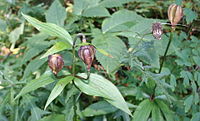| Lilium medeoloides | |
|---|---|

| |
| Scientific classification | |
| Kingdom: | Plantae |
| Clade: | Tracheophytes |
| Clade: | Angiosperms |
| Clade: | Monocots |
| Order: | Liliales |
| Family: | Liliaceae |
| Subfamily: | Lilioideae |
| Tribe: | Lilieae |
| Genus: | Lilium |
| Species: | L. medeoloides |
| Binomial name | |
| Lilium medeoloides A.Gray | |
| Synonyms | |
| |
Lilium medeoloides is an East Asian herb in the lily family. It is native to southeast China, Jeju-do in Korea, Japan and eastern Russia (Kamchatka, Kuril Islands, Sakhalin), where it grows in forests and on grassy and rocky subalpine areas.
It is stem rooting and sports lanceolate stalkless leaves about 12 cm long which are arranged in one or two whorls on the lower part of the stem with odd leaves on the upper part of the stem. The stem is hollow. The plant produces short racemes on which are up to 10 scentless, apricot to orange-red, Turk's-cap style flowers of 4.5 cm with dark spots and purple anthers. The whole plant grows to 40–80 cm.
The name Kurumayuri can be translated as "Lily with wheels".
- formerly included
- Lilium medeoloides var. obovatum Franch. & Sav., now called Lilium hansonii Leichtlin ex D.D.T.Moore
Gallery
| Leaves | Flower | Fruit | In Mount Haku |
|---|---|---|---|

|

|

|

|
References
- ^ Kew World Checklist of Selected Plant Families
- Ohwi, J. (1984). Flora of Japan (in English): 1-1067. Smithsonian Institution, Washington, D.C.
- Lee, W.T. (1996). Lineamenta Florae Koreae: 1-1688. Soul T'ukpyolsi: Ak'ademi Sojok.
- "Flora of China Vol. 24 Page 138 浙江百合 zhe jiang bai he Lilium medeoloides A. Gray, Mem. Amer. Acad. Arts, ser. 2. 6: 415. 1858". Archived from the original on 2015-09-20. Retrieved 2015-04-30.
- Christopher Brickell, The Royal Horticultural Society Encyclopedia of Garden Plants, Dorling Kindersly Ltd., London, 1996, p617, ISBN 0-7513-0436-0
- "The genus Lilium, Lilium medeoloides A. Gray 1859 , Section 1 浙江百合 zhe jiang bai he". Archived from the original on 2011-09-30. Retrieved 2011-08-04.
![]() Media related to Lilium medeoloides at Wikimedia Commons
Media related to Lilium medeoloides at Wikimedia Commons
This Liliales article is a stub. You can help Misplaced Pages by expanding it. |